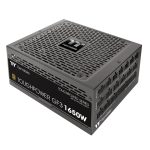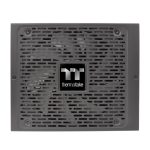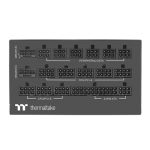With the imminent launch of the RTX 40-series graphics cards expected to use PCIe 5.0 power connectors, various PSU manufacturers have started to release their first ATX 3.0-ready units supporting such connectors. Thermaltake has now joined the party with the Toughpower GF3 series.
Available with 750W, 850W, 1000W, 1200W, 1350W, and 1650W capacities, the 80 Plus Gold Toughpower GF3 PSUs come with PCIe 5.0 power connectors, delivering up to 600W per 12+4 interface. As an ATX 3.0-ready PSU, Thermaltake ensures the new PSUs have a 70% efficiency at just 2% load and comply with PSU timing standards for stable operation at any load.
With a modular design and low-profile flat cables, the Thermaltake GF3 power supplies should help tidying up the system's cabling that bit easier. Like most high-end PSUs, the GF3 PSUs come with 105 °C Japanese capacitors. Moreover, it has a Smart Zero Fan feature that enables the PSU to work in hybrid mode, as the 135/140mm fan only starts spinning at 30% load. If you prefer the fan to function normally, you can do so by flipping the physical switch at the rear of the PSU.
On top of all these features, Thermaltake promises the new PSUs will have a ripple noise below 30mV on all units, except for the 1650W model. In addition, the GF3 voltage regulation complies with Intel's standard +5%, -7% for major rails, but the GF3 750W, 850W, 1000W, and 1200W variants go down to ±2% on these same rails.
You can view the range at Ebuyer here, with the 1650W model priced at £379.98.
Discuss on our Facebook page HERE.
KitGuru says: Wether you're planning to build an entry-level system, a mid-range gaming PC, or a high-end workstation, the Thermaltake GF3 series can cover the power requirements of most consumers.
 KitGuru KitGuru.net – Tech News | Hardware News | Hardware Reviews | IOS | Mobile | Gaming | Graphics Cards
KitGuru KitGuru.net – Tech News | Hardware News | Hardware Reviews | IOS | Mobile | Gaming | Graphics Cards








